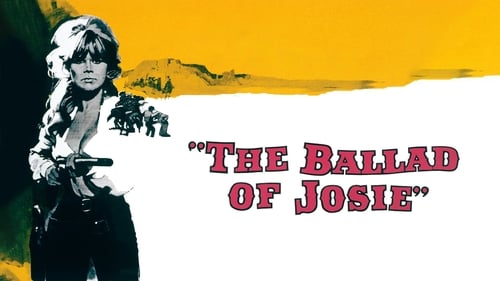weezeralfalfa
Very entertaining blend of war between obstinate opponents in a stock-raising corner of Wyoming(WY), intertwined with a pioneer women's rights movement, and interspersed by periodic bouts of slapstick comedy, mostly involving star Doris Day. I'm very surprised that no one has commented on the very similar theme of this story to that of Doris's reported favorite film: "Calamity Jane", made about 15 years earlier. In fact, the even earlier "Anne Get Your Gun", which Doris so wanted to star in, also has the same theme. Of course, these two earlier films were musical romantic comedies, whereas the musical part is absent from the present film, except for a couple of background songs, including the title song. But, all 3 films involved a women in the Wild West or a Wild West show trying to show that she can be as tough or skilled as a man doing something(s) generally considered an exclusively male skill or occupation, trying to be an independent woman, while also wanting to be desired by the man of her choice.Calamity Jane eventually turns into contemporary Doris Day at the end. It's the same in this film, after a wild ride of Jose(Doris) trying to prove that, as a newly widowed townie, she can cut it as a sheep owner in cattle-only WY country, with only a couple of shepherds and sheep dogs as aids. Unfortunately, we never get to find out if this would have worked out well, because a 'posse' of cattlemen are determined to destroy her operation. Urbane Jason(Per Graves), who obviously has had the hots for Jose for some years, is caught in the middle, trying to dissuade Jose from sticking to her very unpopular dream, while helping to protect her and her flock from the intended depredations of the adversary cattlemen. We never learn what Jason does for a living, but he clearly has political skills, which are severely tested throughout this story,and is running for US senator for the new state of Wyoming in the finale scene. This story supposedly takes place in Arapahoe county, in the SE corner of Wyoming, around 1890, when the citizens of WY are applying for statehood. Well, there never was an Arapahoe county here, But, due south, in north central Colorado(CO), there was(and still is) an Arapahoe county, which at that time included Denver. Historically, most of the sheep-cattle wars in this region involved northern CO cattlemen attacking sheepmen in or from neighboring WY.However, the screenwriters wanted to include the issue of women's civil rights in the story. Thus, they wanted to site the story in WY since, historically, that's where women first acquired voting and some other civil rights within the US. Although it is briefly alluded to in the film(by DA Charlie Ward and Jose), you may not have caught the complicated situation regarding women's civil rights at this time. WY territory women had been granted voting and certain other civil rights in 1869: the first in the US, after a minimal campaign. When this story takes place, the US Congress is strongly opposed to approving a proposed WY state constitution which includes the civil liberties women enjoyed under the territorial government(historically true). That's what the fuss is about, with the cattlemen's opposition to Jose's legal right to choose to raise sheep being transformed into a political battle between the sexes. But, that's not what Jose wants! She just wants to be left alone to pursue her dream. Unfortunately, that's not to be, as the men, including Jason, finally convince her to change her dream. She decides her revolutionary sheepwoman dreams aren't worth people killing each other, barns being burned, and WY territory being rejected for statehood. She also confides in her pet skunk that too much independence and daring tends to make a miserable life for a woman.(Incidentally, Congress finally gave in and allowed WY state women to vote).Doris may have been in her early 40s when she made this film, but she was just as spunky, funny and adorable as she was 15 years earlier in the making of "Calamity Jane". I don't understand why she likes the earlier film, but not this one. Maybe she didn't like the then unfashionable message in the unexpected ending? No matter, she still gives it her all.Like Errol Flynn, in "Montana", Jose herds her sheep through the town's main street to clearly announce her unpopular intentions to all. However, unlike Jose, Flynn succeeds in keeping his flock and convincing some cattlemen to include sheep, despite the vigorous opposition of a cattle queen. The men(man) win the war of persistence against a woman in both films!Why didn't Jose defend herself against the accusation that she deliberately pushed her chronically unemployed drunk abusive husband down the stairs to his death? Did women have the right to testify in court on their behalf then?George Kennedy(as Arch) is good as the leader of the opposition to Jose's sheep flock, as well as the most vocal opponent to women's civil rights. Andy Devine tries to be an impartial judge, and William Telman makes an often sympathetic forceful DA(and seemingly acts like the territorial governor). Timothy Scott, as one of Jose's shepherds, does a great impression of a sympathetic southern hillbilly. The other character actors and actresses generally were also good.
foggyday
I like Doris Day and try to get all her films in german. You cannot imagine how happy I was, when I received "The Ballad of Josie" ( Das Teufelsweib aus Texas )( german title). It's a rare film, but I like it because of Doris. Well, people who enjoyed "Pillow Talk" won't like to watch this one, I guess. In this film are some funny moments, for example when Doris wears jeans and surprise the men or when she is falling on the bed. But you can't compare it to her better films. I can only say, Doris is in it, some other good actors and the plot isn't bad at all.

